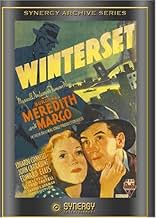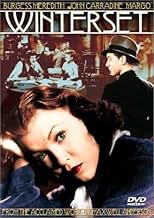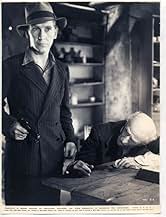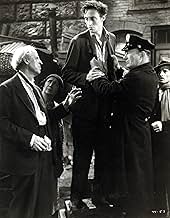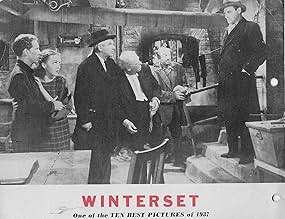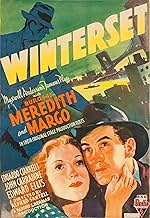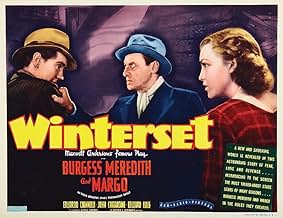AVALIAÇÃO DA IMDb
6,1/10
526
SUA AVALIAÇÃO
Adicionar um enredo no seu idiomaImmigrant radical Bartolomeo Romagna is falsely condemned and executed for a payroll robbery. Years later, his son Mio sets out to find the truth of the crime and to bring to account the gan... Ler tudoImmigrant radical Bartolomeo Romagna is falsely condemned and executed for a payroll robbery. Years later, his son Mio sets out to find the truth of the crime and to bring to account the gangster Trock Estrella.Immigrant radical Bartolomeo Romagna is falsely condemned and executed for a payroll robbery. Years later, his son Mio sets out to find the truth of the crime and to bring to account the gangster Trock Estrella.
- Direção
- Roteiristas
- Artistas
- Indicado a 2 Oscars
- 4 vitórias e 4 indicações no total
Murray Alper
- Louie
- (não creditado)
- Direção
- Roteiristas
- Elenco e equipe completos
- Produção, bilheteria e muito mais no IMDbPro
Avaliações em destaque
WINTERSET was a big hit on Broadway and RKO's decision to retain Burgess Meredith, Margo, and Eduardo Ciannelli to repeat their original stage roles is a major reason for the success of the film version. That they were able to adapt their performances to the intimacy of the camera is remarkable. Maxwell Anderson's dialogue is naturalized considerably from its poetic original but enough of the beautiful lyricism is retained in Anthony Veiler's screenplay to make it a very special script. While Ted Hecht must have been very good on Broadway as Garth, Paul Guilfoyle's performance in the film resulted in perhaps his best and most important screen work. Two other performances deserve special mention. Stanley Ridges as Shadow is menacing without being paranoid as is his boss, played by Ciannelli. Ridges' bloody appearance in the Esdras doorway is one of the most shocking screen moments in 30's cinema. And Willard Robertson, who made a career out of playing impatient meanies is beautifully obstinate as the boorish patrolman. Russian actor Maurice Moscovitch makes his screen debut as Garth and Miriamme's father. A veteran of the Yiddish Theater, Moscovitch later played Paulette Goddard's father in THE GREAT DICTATOR but died before that picture's release. Another Russian, Mischa Auer, makes one of his rare dramatic appearances as a social radical.
The physical set is beautiful, especially the stone-style recreation of the alley and stairwells beneath the Brooklyn Bridge. Finally, the film boasts a rare original score by Nathaniel Shilkret. Shilkret was a longtime bandleader who made records for RCA. He was hired as part of the RKO music staff in 1936 to replace Max Steiner who was leaving to join fledgling org Selznick-International. Shilkret's bold compositions for WINTERSET enhance the theatricality of film, though most of the dupe prints extant on video reproduce the soundtrack with very limited fidelity.
For modern audiences with little patience for plays-made-into-films that represent their stage origins, WINTERSET will be a disappointment. But for those who can appreciate the care with which director Alfred Santell took to recreate much of the prosaic beauty of the Broadway original, WINTERSET will be a rewarding experience - if you can see it in a respectable copy.
The physical set is beautiful, especially the stone-style recreation of the alley and stairwells beneath the Brooklyn Bridge. Finally, the film boasts a rare original score by Nathaniel Shilkret. Shilkret was a longtime bandleader who made records for RCA. He was hired as part of the RKO music staff in 1936 to replace Max Steiner who was leaving to join fledgling org Selznick-International. Shilkret's bold compositions for WINTERSET enhance the theatricality of film, though most of the dupe prints extant on video reproduce the soundtrack with very limited fidelity.
For modern audiences with little patience for plays-made-into-films that represent their stage origins, WINTERSET will be a disappointment. But for those who can appreciate the care with which director Alfred Santell took to recreate much of the prosaic beauty of the Broadway original, WINTERSET will be a rewarding experience - if you can see it in a respectable copy.
The drama itself is interesting to watch in this adaptation of Maxwell Anderson's play, and the themes that it brings out include some particularly weighty ones. The solid cast included at least three performers who were continuing their Broadway roles, and while the production does have a stagy feel at times, it often seems rather appropriate to the material.
The brief prologue shows a political extremist (who is presumably also an immigrant) wrongly accused and executed for a murder committed by a holdup gang. The circumstances are similar to those in some notorious real cases of a slightly earlier era, in which politically unpopular persons were railroaded into convictions because of the public's fear of their beliefs.
The main action starts with Burgess Meredith portraying the executed man's son, now an adult, and determined to get to the bottom of the case despite the obstacles that have come with time. In the course of things, he encounters the judge who had presided over his father's trial, a witness with important information, and a brutal crime boss who is determined to prevent the case from being re-opened. The setup produces some good psychological and ethical tensions, in addition to the drama on the surface.
Most of the supporting cast performs well. John Carradine has a brief role as the father, Margo has a good and important role as a young woman torn between family loyalty and her attraction to Meredith's character, and Eduardo Ciannelli believably portrays the soulless, desperate crime boss. Mischa Auer succeeds in a brief, atypical role as a street agitator. But Edward Ellis gives the best performance, as the judge whose conscience has been tormented ever since the fateful case. The characters and the tragic situation that links them are all effectively portrayed.
The brief prologue shows a political extremist (who is presumably also an immigrant) wrongly accused and executed for a murder committed by a holdup gang. The circumstances are similar to those in some notorious real cases of a slightly earlier era, in which politically unpopular persons were railroaded into convictions because of the public's fear of their beliefs.
The main action starts with Burgess Meredith portraying the executed man's son, now an adult, and determined to get to the bottom of the case despite the obstacles that have come with time. In the course of things, he encounters the judge who had presided over his father's trial, a witness with important information, and a brutal crime boss who is determined to prevent the case from being re-opened. The setup produces some good psychological and ethical tensions, in addition to the drama on the surface.
Most of the supporting cast performs well. John Carradine has a brief role as the father, Margo has a good and important role as a young woman torn between family loyalty and her attraction to Meredith's character, and Eduardo Ciannelli believably portrays the soulless, desperate crime boss. Mischa Auer succeeds in a brief, atypical role as a street agitator. But Edward Ellis gives the best performance, as the judge whose conscience has been tormented ever since the fateful case. The characters and the tragic situation that links them are all effectively portrayed.
Winterset starts out beautifully and profoundly. The story flows well, but the latter scenes are so implausibly constrained that I ended up losing sympathy for the characters. The dialog was hard to make sense of at times, and many of the movie's sequences look like dark scenes from a bad dream... you know, the kind of situation you just can't escape from.
It looks as though, in the transition to turning the stage play into a movie, the makers never gave much thought to overcoming the obvious limitations that the stage imposes on what we now think of as the "action sequences".
I don't regret the time spent watching Winterset. It was interesting, but as a movie (and even allowing for its vintage) it was just "OK".
It looks as though, in the transition to turning the stage play into a movie, the makers never gave much thought to overcoming the obvious limitations that the stage imposes on what we now think of as the "action sequences".
I don't regret the time spent watching Winterset. It was interesting, but as a movie (and even allowing for its vintage) it was just "OK".
From RKO studios in 1936 (though it looks as though it were made in the earliest 30s), during the heyday of the Astaire-Rogers musicals, came something rich and strange. Maxwell Anderson's very serious poetic play was boiled down into a movie that's part Depression-era gangster flick, part Shavian social-issue drama, and part neo-Greek tragedy.
The igniting fuse was the Nicola Sacco/Bartolomeo Vanzetti case of 1927, where two immigrant anarchists were condemned (some would say railroaded) to death supposedly for a robbery in which guards were killed. Anderson pushes it back to 1920 and focuses on a single man, Bartolomeo Romagna (John Carradine), whose auto, filled with anarchist/socialist tracts, is stolen for a similar crime by gangster Eduardo Cianelli. When condemned, Carradine eloquently rebukes the judge (Edward Ellis).
The film now flashes forward to 1936, when Romagna's down-and-out drifter son (Burgess Merdith), spurred by revisionist theories of the case, journeys to New York to confront the surviving principals, including Cianelli, Ellis and a reluctant witness (Paul Guildfoyle). All converge for a reckoning preordained by The Fates....
Anderson has heightened his dialogue to lend it immortal aspirations (which may have been a grandiose miscalculation the dominant rhetorical mode of the twentieth century, obvious even by 1936, is flatting). The high-flown posture extends to the look of the film, too a stylized nightscape that's a harbinger of the look of film noir to come a few years later. A low-ceilinged tenement-basement flat is oppressively claustrophobic (markedly so, given the number of actors crammed into it), while the cobblestones and stone arches of the low-rent streets near New York's waterfront glisten wickedly in the pelting rain. (At times the slums look like the central squares of those Transylvanian villages so common in Universal horror pix of this era).
Almost every element of Winterset should seem laughable now but doesn't (though there are a few close shaves). There's an early sequence involving a hurdy-gurdy that lures the slum-dwelling underclass out of its burrows to dance that's hauntingly powerful as is the face of Winterset's love interest, an actress known as Margo, that harks back to the expressiveness of the silents.
The igniting fuse was the Nicola Sacco/Bartolomeo Vanzetti case of 1927, where two immigrant anarchists were condemned (some would say railroaded) to death supposedly for a robbery in which guards were killed. Anderson pushes it back to 1920 and focuses on a single man, Bartolomeo Romagna (John Carradine), whose auto, filled with anarchist/socialist tracts, is stolen for a similar crime by gangster Eduardo Cianelli. When condemned, Carradine eloquently rebukes the judge (Edward Ellis).
The film now flashes forward to 1936, when Romagna's down-and-out drifter son (Burgess Merdith), spurred by revisionist theories of the case, journeys to New York to confront the surviving principals, including Cianelli, Ellis and a reluctant witness (Paul Guildfoyle). All converge for a reckoning preordained by The Fates....
Anderson has heightened his dialogue to lend it immortal aspirations (which may have been a grandiose miscalculation the dominant rhetorical mode of the twentieth century, obvious even by 1936, is flatting). The high-flown posture extends to the look of the film, too a stylized nightscape that's a harbinger of the look of film noir to come a few years later. A low-ceilinged tenement-basement flat is oppressively claustrophobic (markedly so, given the number of actors crammed into it), while the cobblestones and stone arches of the low-rent streets near New York's waterfront glisten wickedly in the pelting rain. (At times the slums look like the central squares of those Transylvanian villages so common in Universal horror pix of this era).
Almost every element of Winterset should seem laughable now but doesn't (though there are a few close shaves). There's an early sequence involving a hurdy-gurdy that lures the slum-dwelling underclass out of its burrows to dance that's hauntingly powerful as is the face of Winterset's love interest, an actress known as Margo, that harks back to the expressiveness of the silents.
Despite having read the liner notes, I thought from the publicity artwork that WINTERSET would be something Gothic. It is Gothic, in its bleakness, but is squarely centered in the Depression era of the United States. It was completely of it's time, and considering that the film was adapted from the Broadway play, it must have been daring, with sub themes of socialism and police corruption. (The play was by Maxwell Anderson, who wrote KEY LARGO and THE BAD SEED.) Perhaps that contributed to the film receiving two Academy Award nominations.
This is the story of Mio (Bartholomio a young, dewy Burgess Merideth) trying to clear his father's name. In the first scenes, his namesake Father, played with riveting stillness by the painfully thin John Carradine, was accused of murder he did not commit, given no defense, and put to death. Years later, his son goes to the slums of New York to try to find out the truth.
I had to remind myself that this was made in 1936, so it is still very early in the talkies. The sets are a wonderful blend of realism and expressionism (similar to the famous stage sets of Arthur Miller's A VIEW FROM THE BRIDGE), giving this a Gothic noir flavor. Rain is often used as a "purifier" in stage and film, but here it is effectively used to create an oppressive humidity, a torrent of sludge. It is clear that film noir, Orson Wells, and THE THIRD MAN's Director Carol Reed all owe a debt to early films like this. The set elements are all here in tight proximity, the stone, the shadowed doorways, the waterways.
In fact, one irony is that one of the lead actors does look very much like Orson Wells. He plays the brother of Mariama (played by Margot, who is probably best known as the duplicitous woman in Capra's LOST HORIZON). Margot's transition to film is not as ideal as Merideth's, her style is more of the old school careful vocal production that may be the product of overcoming an accent. But she looks luminous and innocent, and fills the screen with a simple hopefulness at odds with the dark surroundings. The villain of the piece is simply fantastic completely believably sociopathic without any extravagant ticks or frothing at the mouth.
This is pre-method-acting, but that spare realism is all here, especially in the performances of Carradine and Merideth. This entire film holds up as a moment of history of social themes and thought of that day that still resonate. The Broadway cast seems to have been lifted intact (which should be a lesson to modern filmmakers to use stage actors instead of vice-verse). There are one or two flowery monologues, but for the most part, the transition from stage to film goes very well, and the story and script are spare and universal enough to stand the test of time well. This is a fascinating moment of film history which has luckily made its way to DVD.
This is the story of Mio (Bartholomio a young, dewy Burgess Merideth) trying to clear his father's name. In the first scenes, his namesake Father, played with riveting stillness by the painfully thin John Carradine, was accused of murder he did not commit, given no defense, and put to death. Years later, his son goes to the slums of New York to try to find out the truth.
I had to remind myself that this was made in 1936, so it is still very early in the talkies. The sets are a wonderful blend of realism and expressionism (similar to the famous stage sets of Arthur Miller's A VIEW FROM THE BRIDGE), giving this a Gothic noir flavor. Rain is often used as a "purifier" in stage and film, but here it is effectively used to create an oppressive humidity, a torrent of sludge. It is clear that film noir, Orson Wells, and THE THIRD MAN's Director Carol Reed all owe a debt to early films like this. The set elements are all here in tight proximity, the stone, the shadowed doorways, the waterways.
In fact, one irony is that one of the lead actors does look very much like Orson Wells. He plays the brother of Mariama (played by Margot, who is probably best known as the duplicitous woman in Capra's LOST HORIZON). Margot's transition to film is not as ideal as Merideth's, her style is more of the old school careful vocal production that may be the product of overcoming an accent. But she looks luminous and innocent, and fills the screen with a simple hopefulness at odds with the dark surroundings. The villain of the piece is simply fantastic completely believably sociopathic without any extravagant ticks or frothing at the mouth.
This is pre-method-acting, but that spare realism is all here, especially in the performances of Carradine and Merideth. This entire film holds up as a moment of history of social themes and thought of that day that still resonate. The Broadway cast seems to have been lifted intact (which should be a lesson to modern filmmakers to use stage actors instead of vice-verse). There are one or two flowery monologues, but for the most part, the transition from stage to film goes very well, and the story and script are spare and universal enough to stand the test of time well. This is a fascinating moment of film history which has luckily made its way to DVD.
Você sabia?
- CuriosidadesBurgess Meredith, in his first film with a credited role, recreates the role he played in the original Broadway production.
- ConexõesFeatured in Sprockets: Masters of Menace (1995)
Principais escolhas
Faça login para avaliar e ver a lista de recomendações personalizadas
- How long is Winterset?Fornecido pela Alexa
Detalhes
- Data de lançamento
- País de origem
- Idiomas
- Também conhecido como
- Winterset
- Locações de filme
- Empresa de produção
- Consulte mais créditos da empresa na IMDbPro
- Tempo de duração1 hora 17 minutos
- Cor
- Proporção
- 1.37 : 1
Contribua para esta página
Sugerir uma alteração ou adicionar conteúdo ausente

Principal brecha
By what name was Os Predestinados (1936) officially released in India in English?
Responda
